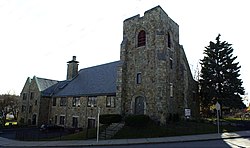Hyde Park | |
|---|---|
 The First Congregational Church of Hyde Park | |
| Nickname: A Small Town in the City | |
| Motto(s): Si Tentas Perfice (Latin) "If you begin, finish" | |
 | |
| Country | United States |
| State | Massachusetts |
| County | Suffolk |
| Neighborhood of | Boston |
| Incorporated | April 22, 1868 |
| Annexed by Boston | January 1, 1912 |
| Time zone | UTC−5 (Eastern) |
| ZIP Code | 02136 |
| Area code | 617/857 |
| Website | Official website |
Hyde Park is the southernmost neighborhood of Boston, Massachusetts, United States.[1] Situated 7.9 miles south of downtown Boston, it is home to a diverse range of people, housing types and social groups. It is an urban location with suburban characteristics.
Hyde Park is covered by Boston Police Department District E-18 located in Cleary Square, and the Boston Fire Department station on Fairmount Avenue is the quarters of Ladder Company 28 & Engine Company 48. Boston EMS Ambulance Station 18 is located on Dana Avenue. Hyde Park also has a branch of the Boston Public Library.
The George Wright Golf Course, named for Baseball Hall of Fame and Boston Red Stockings shortstop George Wright, is in Hyde Park and Roslindale. It is a Donald Ross–designed course and is considered one of his finest designs.
Hyde Park has taken the motto "A Small Town in the City" because of its suburban feel. The area was established in the 1660s and grew into a hub of paper and cotton manufacturing in the eighteenth century. The extension of rail lines from Boston in the 1850s spurred the area's residential development. The Readville section of Hyde Park contained a large manufacturing base housing the massive operations of the B. F. Sturtevant Company and the New York, New Haven & Hartford Railroad Locomotive and Car Shops.
Hyde Park and some of its residents have been important part of societal change in the United States. It was once home to the first all African-American army unit, the 54th Massachusetts Infantry Regiment. The regiment was made famous in the movie Glory. Hyde Park was home to the prominent abolitionists the Grimké sisters, Sarah and Angelina, as well as Theodore Dwight Weld, for whom Weld Hall in Hyde Park is named.
- ^ "Boston's Neighborhoods: Hyde Park". Boston Redevelopment Authority (BRA). 2010. Retrieved August 18, 2010.
